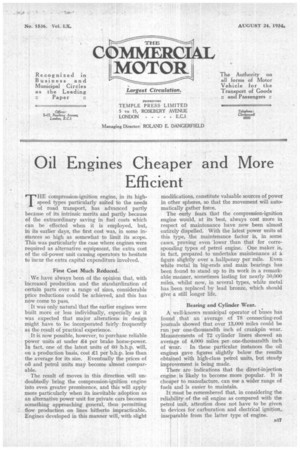Oil Engines Cheaper and More Efficient
Page 31

Page 32

If you've noticed an error in this article please click here to report it so we can fix it.
THE compression-ignition engine, in its highspeed types particularly suited to the needs of road transport, has advanced partly because of its intrinsic merits and partly because of the extraordinary saving in fuel costs which can be effected when it is employed, but, in its earlier days, the first cost was, in some instances so high as somewhat to limit its scope. This was particularly the case where engines were required as alternative equipment, the extra cost of the oil-power unit causing operators to hesitate to incur the extra capital expenditure involved.
First Cost Much Reduced.
We have always been of the opinion that, with increased production and the standardization of certain parts over a range of sizes, considerable price reductions could be achieved, and this has now come to pass.
It was only natural that the earlier engines were built more or less individually, especially as it was expected that major alterations in design might have to be incorporated fairly frequently as the result of practical experience.
It is now possible, however, to purchase reliable power units at under £4 per brake horse-power. In fact, one of the latest units of 60 b.h.p, will, on a production basis, cost £1 per b.h.p. less than the average for its size. Eventually the prices of oil and petrol units may become almost comparable.
The result of moves in this direction will undoubtedly bring the compression-ignition engine into even greater prominence, and this will apply more particularly when its inevitable adoption as an alternative power unit for private cars becomes something approaching general, thus permitting flow production on lines hitherto impracticable. Engines developed in this manner will, with slight modifications, constitute valuable sources of power in other spheres, so that the movement will automatically gather force.
The early fears that the compression-ignition engine would, at its best, always cost more in respect of maintenance have now been almost entirely dispelled. With the latest power units of this type, the maintenance factor is, in some cases, proving even lower than that for corresponding types of petrol engine. One maker is, in fact, prepared to undertake maintenance at a figure slightly over a halfpenny per mile. Even white metal in big-ends and main bearings has been found to stand up to its work in a remarkable manner, sometimes lasting for nearly 50,000 miles, whilst new, in several types, white metal has been replaced by lead bronze, which should give a still longer life.
Bearing and Cylinder Wear.
A well-known municipal operator of buses has found that an average of 78 connecting-rod journals showed that over 13,000 miles could be run I per one-thousandth inch of crankpin wear. Measurements of 72 cylinder liners showed an average of 4,000 miles per, one-thousandth inch of wear. In these particular instances the oil engines gave figures slightly below the results obtained with high-class petrol units, but steady improvement is being made. There are indications that the direct-injection engine is likely to become more popular. It is cheaper to manufacture, can use a wider range of fuels and is easier to maintain.
It must be remembered that, in considering the reliability of the oil engine as compared with the petrol unit, attention does not have to• be given to devices for carburation and electrical ignition, inseparable from the latter type of engine.
New Vehicles for Old
STRIKING proof of the fundamental wisdom of the policy of purchasing new vehicles and discarding out-of-date equipment at frequent intervals is afforded-13$,r example rather than by precept—by the action of several of those passenger transport operators in the London area who, as the outcome of the establishment of the London Passenger Transport Board, have been paid substantial sums in cash in compensation for parts of their undertakings acquired by the Board. Wherever such operators have under their control services that extend beyond the limits of the area controlled by the Board, which services, of course, they are continuing to run, it is to be observed that they have taken the opportunity to replace their existing rolling stock by new vehicles. The point to be observed is that all these operators, being men of experience, have realized that their prospects of continued success are bound up with this policy of keeping their rolling stock up to date. They have realized, too, that the opportunity of renewal presented in this access to free capital was one which, having in view their experience and knowledge, they would prefer not to miss.
Linking Up Road and Air
RECENT developments in road and air coordination suggest that there is scope for closer co-operation between road passenger and airtransport companies, to the advantage• of both parties. Particularly in connection with coach tours should road and air co-operation prove of value.
Man Y foreign visitors who travel by air to England would doubtless be interested in touring by coach, especially if their holiday trips could be arranged in advance in their own countries. An interworking agreement between a coach operator and an air-transport concern would enable visitors to England to book for road tours before they commenced their holidays, whilst, in return, the road-travel specialist could represent the aviation company. Road and air co-ordination should possess valuable possibilities, for the two forms of transport are complementary and not competitive. Indeed, an enterprising road-transport operator who already provides ground-travel facilities for an air service from France is giving a lead to the industry in taking steps to exploit commercial aviation for the benefit of coachir




























































































